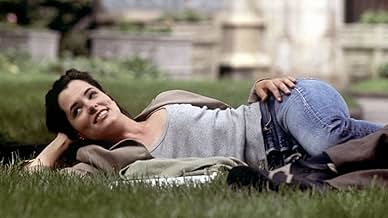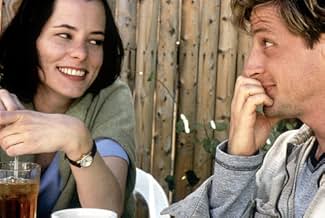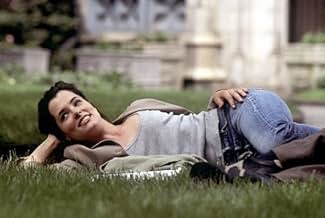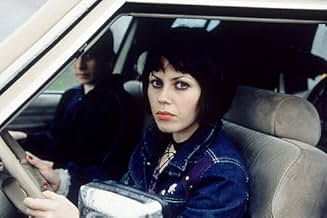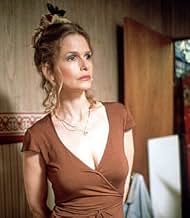AVALIAÇÃO DA IMDb
6,4/10
4 mil
SUA AVALIAÇÃO
Adicionar um enredo no seu idiomaThree women's escapes from their afflicted lives. Each struggles to flee from the men who confine their personal freedom.Three women's escapes from their afflicted lives. Each struggles to flee from the men who confine their personal freedom.Three women's escapes from their afflicted lives. Each struggles to flee from the men who confine their personal freedom.
- Prêmios
- 6 vitórias e 5 indicações no total
John Ventimiglia
- Narrator
- (narração)
Joel de la Fuente
- Thavi Matola
- (as Joel De La Fuente)
Avaliações em destaque
This film, directed and written by Rebecca Miller, is a very satisfying experience for a new director who, here, is adapting her own material with a lot of relish and savoir-faire. There's a certain elegance in the way she treats her characters, always respectful, yet incisive. The only complain we could raise is the fact that each story is very short, so when we are still savoring each one, individually, Ms Miller, for reasons of timing, pulls them from under us.
The first story, Delia, shows a woman's worst fears in being married to a wife beater of the worst kind. She might have had dreams of making a happy home for her family, but her man has another thing in mind. This woman is a step above white trash. She tries hard to get herself together but everything keeps interfering with her independence. Played with gusto by Kyra Sedwick, Delia ends up as a waitress in order to support herself and the children. Her encounter with the bully from the restaurant is an exercise in how low they want her to go, but she comes out a winner.
The second story, Greta, is the best of the three. With the help of the great Parker Posey, this Greta comes out as the tough woman she wants everyone to think of her, but deep down, inside her, she's a vulnerable and frightened and unfulfilled over achiever. Ms Posey has never shown so many nuances in a performance that is so economic in the terms that are dictated by the length of the story. We get to know more about her than the narrator ever tells us. Every expression on this actress face is true. It's surprising what has been achieved here with the collaboration of the director and the player.
The last story, Paula, is the weakest. It's all about a very confused young woman who's out on the road to see her parents. She has very deep problems. Along the way she picks up a hitchhiker who stays with her through the trip. Paula is in a voyage of discovering, but little does she know that what she needs is what she has left at home: her Haitian man, who obviously cares a lot about her. As played by Fairuza Balk, she shows the turmoil in her head that only she can resolve.
We hope Miss Miller's next time out will be very soon because she's got a feel for getting inside her characters and finding angles they didn't even suspect of having.
The first story, Delia, shows a woman's worst fears in being married to a wife beater of the worst kind. She might have had dreams of making a happy home for her family, but her man has another thing in mind. This woman is a step above white trash. She tries hard to get herself together but everything keeps interfering with her independence. Played with gusto by Kyra Sedwick, Delia ends up as a waitress in order to support herself and the children. Her encounter with the bully from the restaurant is an exercise in how low they want her to go, but she comes out a winner.
The second story, Greta, is the best of the three. With the help of the great Parker Posey, this Greta comes out as the tough woman she wants everyone to think of her, but deep down, inside her, she's a vulnerable and frightened and unfulfilled over achiever. Ms Posey has never shown so many nuances in a performance that is so economic in the terms that are dictated by the length of the story. We get to know more about her than the narrator ever tells us. Every expression on this actress face is true. It's surprising what has been achieved here with the collaboration of the director and the player.
The last story, Paula, is the weakest. It's all about a very confused young woman who's out on the road to see her parents. She has very deep problems. Along the way she picks up a hitchhiker who stays with her through the trip. Paula is in a voyage of discovering, but little does she know that what she needs is what she has left at home: her Haitian man, who obviously cares a lot about her. As played by Fairuza Balk, she shows the turmoil in her head that only she can resolve.
We hope Miss Miller's next time out will be very soon because she's got a feel for getting inside her characters and finding angles they didn't even suspect of having.
as you probably have heard, this is a movie that consists of three portraits. three very contrived, hard-to-watch portraits.
this movie charges out of the gate with incredible potential, including a great cast, an effective score, and nearly disorienting (yet, rather successful) camera work. additionally, at the start of the first portrait, the narrative freezes, and the narrator urges the viewer to, "wait!" so he can explain something about what's going on. this device is wonderful, and immediately gives the viewer a healthy shot of intrigue. additionally, at this point, you'll probably be really excited at the unorthodox pacing that the film seems to be setting up.
that's all in the first few minutes. and this movie literally screamed in a nosedive downward from there.
while "personal velocity" bucks conventions in many ways, it bucks the concept of storytelling so much that it is simply contrived. want to see development, plot, resolution? not here. this movie tries HARD to dodge all these things, and relentlessly starves the viewer of any of these elements with its spare dialogue.
but in the absence of these elements, what's left is - quite frankly - repetition. the characters simply keep doing what they did in the first moments of their portrait (or at least what the filmmakers set them up to do). and while they rather gratingly repeat their actions, there is no true character development.
to combat this (and surely the problem of converting short stories to film), the movie employs a narrator. this (and the repetition) is the downfall. first of all, who is the narrator? well, it's a male, which is strange since this is mainly a story about three women. ok, but why is he male? and why is he speaking so conversationally at some points? and why does he know of all these women? none of these questions are answered, and the viewer is forced to contend with this narrator who speaks incessantly throughout the entire film.
now this narrator suffers from an additional problem, which plagues the film: heavy-handedness. the narrator says things like, "she could feel the emotion like a vortex pulling her soul inward." that's actually not a direct quote, but it's very close. i am not exaggerating. at one point a character says, "you look you're waiting for something." and the narrator breaks in, "she was, she always has been." this movie can't afford such lead-weighted narration. and it certainly does not fall in line with the narrator's other parts where he's talking about how great kyra sedgewick's ass looks in jeans.
in the end, you've got however many minutes (i don't know 90ish?) of superb acting and inventive cinematography. but anchoring it down without an inch of slack to go anywhere is an overbearing narrator, and three equally overbearing and repetitious movements of what could have probably been a compelling film.
this movie charges out of the gate with incredible potential, including a great cast, an effective score, and nearly disorienting (yet, rather successful) camera work. additionally, at the start of the first portrait, the narrative freezes, and the narrator urges the viewer to, "wait!" so he can explain something about what's going on. this device is wonderful, and immediately gives the viewer a healthy shot of intrigue. additionally, at this point, you'll probably be really excited at the unorthodox pacing that the film seems to be setting up.
that's all in the first few minutes. and this movie literally screamed in a nosedive downward from there.
while "personal velocity" bucks conventions in many ways, it bucks the concept of storytelling so much that it is simply contrived. want to see development, plot, resolution? not here. this movie tries HARD to dodge all these things, and relentlessly starves the viewer of any of these elements with its spare dialogue.
but in the absence of these elements, what's left is - quite frankly - repetition. the characters simply keep doing what they did in the first moments of their portrait (or at least what the filmmakers set them up to do). and while they rather gratingly repeat their actions, there is no true character development.
to combat this (and surely the problem of converting short stories to film), the movie employs a narrator. this (and the repetition) is the downfall. first of all, who is the narrator? well, it's a male, which is strange since this is mainly a story about three women. ok, but why is he male? and why is he speaking so conversationally at some points? and why does he know of all these women? none of these questions are answered, and the viewer is forced to contend with this narrator who speaks incessantly throughout the entire film.
now this narrator suffers from an additional problem, which plagues the film: heavy-handedness. the narrator says things like, "she could feel the emotion like a vortex pulling her soul inward." that's actually not a direct quote, but it's very close. i am not exaggerating. at one point a character says, "you look you're waiting for something." and the narrator breaks in, "she was, she always has been." this movie can't afford such lead-weighted narration. and it certainly does not fall in line with the narrator's other parts where he's talking about how great kyra sedgewick's ass looks in jeans.
in the end, you've got however many minutes (i don't know 90ish?) of superb acting and inventive cinematography. but anchoring it down without an inch of slack to go anywhere is an overbearing narrator, and three equally overbearing and repetitious movements of what could have probably been a compelling film.
Closeup- Beth in Car Door Window-Door handle opening as someone gets in-Closeup of his handsome face--Beth: Can you excuse me, I have to stop for donuts. Closeup of Shop Door, Beth walking in then ignition key turning as hitch hiker moves her car. Beth looks away. Beth: Hurry with that couple of dozen, I'm pregnant. She carries the donut box out, gets into the car. The Hitch Hiker's hand grabs a donut from the box, Closeup of a donut hole. His mouth munches one down. Cut to Rain falling on car back window, steam rising and groans from within while he makes out with her. Later, interior, apartment, Beth's hand is seen picking up a script. The cover page reads, "Never use close camera angles or other devices so often it makes the viewer lose interest in the characters and story. Try to film a movie the way you'd like a live audience to watch it. Grade F, see me. Professor Hollywood Hack."
I don't know why there are so many recent attempts at this sort of thing: individual episodes that approach and overlap the same concept. Perhaps it is because it is easier to craft episodes with power rather than worry about an arc of 90 minutes or more.
But we do have them. Some work amazingly well. I found 'Things you can tell' nearly lifealtering because of the crafty way all the actresses picked up each others' mannerisms to merge into the same woman. '!0 Conversations' was a different take, with the action all occurring in the same world. Less effective overall (with a more overt politics) but well structured.
This, however, is a mess. It bludgeons. It repeats. It insists on obviousness. No subtly is allowed: either an effect shouts or is bleached away. And the worst thing, the most damaging thing that can be said: there is no reward, no insight, no enrichment for the rawness we experience.
Wallace Shawn and a talented cinematographer wasted as well. Shame.
The reliable Parker Posey has a line so wonderful, so noticeably superior to all else, I am convinced she made it up: she says she needs to get an underwater camera.
Ted's Evaluation -- 1 of 4: You can find something better to do with this part of your life.
But we do have them. Some work amazingly well. I found 'Things you can tell' nearly lifealtering because of the crafty way all the actresses picked up each others' mannerisms to merge into the same woman. '!0 Conversations' was a different take, with the action all occurring in the same world. Less effective overall (with a more overt politics) but well structured.
This, however, is a mess. It bludgeons. It repeats. It insists on obviousness. No subtly is allowed: either an effect shouts or is bleached away. And the worst thing, the most damaging thing that can be said: there is no reward, no insight, no enrichment for the rawness we experience.
Wallace Shawn and a talented cinematographer wasted as well. Shame.
The reliable Parker Posey has a line so wonderful, so noticeably superior to all else, I am convinced she made it up: she says she needs to get an underwater camera.
Ted's Evaluation -- 1 of 4: You can find something better to do with this part of your life.
I am hard-pressed to explain the praise heaped on this movie, and must sadly choose the obvious. This film would never have been touted as it has if it were made by someone other than Arthur Miller's daughter/Daniel Day Lewis's wife.
Of the film's three vignettes--domestic violence survivor, conflicted editor, and confused runaway--the second is most telling. Greta, the failure to her family, craves success and power in the literary world and only needs to have her innate talents recognized to do so. Her skill is "trimming the fat" from others' writing. However, Ms. Miller seems to have had no such attention paid to her own work. The incessant and intrusive voiceover dialogue, I assume taken directly from her collection of short stories, features pseudo-deep lines that made me literally laugh out loud.
In addition, I found many of the camera tricks and plot devices amateurish and the characters shallow and essentialized. I cannot recommend this film, which basks in its own specialness and its claims to gritty reality. Ms. Miller is a tourist in the lives of the struggling women she attempts to portray.
Of the film's three vignettes--domestic violence survivor, conflicted editor, and confused runaway--the second is most telling. Greta, the failure to her family, craves success and power in the literary world and only needs to have her innate talents recognized to do so. Her skill is "trimming the fat" from others' writing. However, Ms. Miller seems to have had no such attention paid to her own work. The incessant and intrusive voiceover dialogue, I assume taken directly from her collection of short stories, features pseudo-deep lines that made me literally laugh out loud.
In addition, I found many of the camera tricks and plot devices amateurish and the characters shallow and essentialized. I cannot recommend this film, which basks in its own specialness and its claims to gritty reality. Ms. Miller is a tourist in the lives of the struggling women she attempts to portray.
Você sabia?
- CuriosidadesMaria Elena Ramirez's debut.
- Citações
Greta Herskowitz: How could he still love me? If he does, it's because he doesn't know me. I'm rotten with ambition, a lusty little troll, the kind of demon you'd find at the bottom floor of hell pulling fingernails off the loansharks.
- Cenas durante ou pós-créditosTo my mother
- ConexõesFeatured in Personal Velocity: Creating 'Personal Velocity' (2003)
Principais escolhas
Faça login para avaliar e ver a lista de recomendações personalizadas
- How long is Personal Velocity?Fornecido pela Alexa
Detalhes
- Data de lançamento
- País de origem
- Idioma
- Também conhecido como
- Personal Velocity: Three Portraits
- Locações de filme
- Empresas de produção
- Consulte mais créditos da empresa na IMDbPro
Bilheteria
- Orçamento
- US$ 125.000 (estimativa)
- Faturamento bruto nos EUA e Canadá
- US$ 811.299
- Fim de semana de estreia nos EUA e Canadá
- US$ 29.943
- 24 de nov. de 2002
- Faturamento bruto mundial
- US$ 890.502
- Tempo de duração1 hora 26 minutos
- Cor
- Mixagem de som
- Proporção
- 1.85 : 1
Contribua para esta página
Sugerir uma alteração ou adicionar conteúdo ausente

Principal brecha
By what name was O Tempo de Cada Um (2002) officially released in India in English?
Responda

